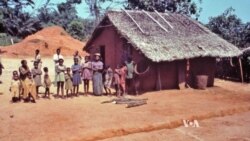The Ebola virus was identified in the 1970s in a tiny village in the Democratic Republic of Congo - where an intrepid team of researchers ventured to learn more. Among them was U.S.-born David Heymann, now a Professor of Epidemiology at the London School of Hygiene and Tropical Medicine.
As a young doctor with the U.S. Center for Disease Control, David Heymann witnessed the emerging threat of Ebola from its origins in the rainforests of the Democratic Republic of Congo -- then Zaire -- in 1976. The small team of international researchers took every precaution.
“The fear was so great that one of my first assignments was to go out to NASA to collect the isolation unit that had been used for the astronauts when they came off the moon,” he told VOA.
Arriving at the village of Yambuku — the center of the outbreak — Heymann and his team knew little about Ebola and named the virus after the local river.
“Ebola was considered a major threat back in 1976 because nothing was known about the virus," he said. "It was known that it was related to, or it appeared to be related to a Marburg virus, which people understood, science understood basically.”
Since then, scientists have discovered fruit bats carry the Ebola virus and pass it on to humans and other primates. Heymann says they soon realized consumption of so-called bush meat is a pathway for the disease.
“There was an outbreak in Gabon in 1996 when there were 18 hunters who killed a chimpanzee," he said. "And all 18 of them somehow, during the butchering process, became infected, took the infection home, and infected family members. But it did not spread further.”
Professor Heymann led the global response to the 2003 SARS virus outbreak in China. The disease killed more than 700 people, but was contained.
“It spread into developing countries in Asia and it was rapidly stopped there by a global effort," said Heymann. "And this was a true coordinated global effort where scientists were working together behind the scenes, exchanging information on a daily basis.”
In contrast, Heymann says early appeals for help with the current Ebola outbreak were ignored.
“There was not a robust enough response to stop it when it was still rural, and now it has spread into urban areas where it is more difficult,” he said.
There are indications that the Ebola education campaigns in West Africa are helping to halt the spread of the virus. New medicines are being fast-tracked. Professor Heymann says another area of research should also be prioritized.
“To determine how best to keep patients alive by maintaining their internal balance of electrolytes and chemicals, so that they can stay alive long enough for their own immune system to take over,” he said.
The World Health Organization says about 6,000 people have died from Ebola in West Africa since the outbreak began. Professor Heymann is optimistic the spread of the virus will have been halted by the beginning of the new year.





